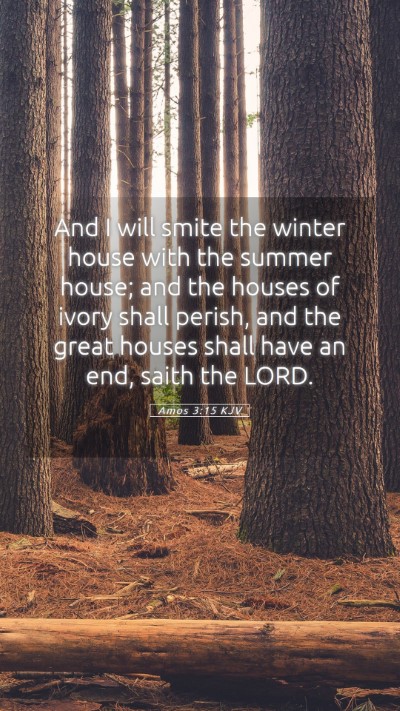Old Testament
Genesis Exodus Leviticus Numbers Deuteronomy Joshua Judges Ruth 1 Samuel 2 Samuel 1 Kings 2 Kings 1 Chronicles 2 Chronicles Ezra Nehemiah Esther Job Psalms Proverbs Ecclesiastes Song of Solomon Isaiah Jeremiah Lamentations Ezekiel Daniel Hosea Joel Amos Obadiah Jonah Micah Nahum Habakkuk Zephaniah Haggai Zechariah MalachiAmos 3:15 Meaning
What is the meaning of Amos 3:15?
And I will smite the winter house with the summer house; and the houses of ivory shall perish, and the great houses shall have an end, saith the LORD.
Amos 3:15 Bible Verse Meaning
Understanding Amos 3:15
Amos 3:15 states: "And I will smite the winter house with the summer house; and the houses of ivory shall perish, and the great houses shall have an end, saith the Lord." This verse is a profound declaration by God through the prophet Amos, emphasizing the coming judgment and the transient nature of earthly possessions and comforts.
Bible Verse Meaning and Interpretation
This verse serves as a stark reminder within the broader context of the prophetic warnings delivered by Amos regarding the nation of Israel. Key insights from various public domain commentaries shed light on its deeper meanings:
-
Matthew Henry’s Commentary:
Henry notes that the verse depicts the divine judgment where God will destroy not only the physical structures (the winter and summer houses) that symbolize luxury but also the ostentatious lifestyles of the wealthy (houses of ivory). This serves as an admonition against materialism and the false sense of security it brings.
-
Albert Barnes’ Notes on the Bible:
Barnes highlights the intent of God to bring down those who trust in their wealth and societal status. The mention of different seasons represents the entirety of one’s life; no matter the season of comfort, judgment will come, illustrating the futility of reliance on material possessions.
-
Adam Clarke’s Commentary:
Clarke elaborates on the concept of the 'winter house' and 'summer house' as metaphors for the fleeting comforts of life. He elucidates the idea that wealth can be deceptive, and God’s judgment serves as a leveler, demonstrating that no one is above reproach, regardless of their earthly status.
Scripture Analysis
When analyzing Amos 3:15, it is essential to consider the historical context of the time, as Israel was experiencing prosperity and spiritual decline. This passage calls for an understanding of God’s character as one who is just and actively involved in the affairs of humanity.
Key Themes:
- Divine Judgment: The destruction of houses symbolizes the coming judgment on those who live in excess while ignoring social justice and righteousness.
- Impermanence of Material Wealth: The mention of both winter and summer houses serves to illustrate that material wealth is temporary and ultimately inconsequential in light of spiritual truths.
- Call to Repentance: This verse invites the reader to reflect on their lives and consider what truly matters beyond worldly pleasures and possessions.
Application of Amos 3:15
For readers seeking to apply the teachings of this verse, it is a profound prompt to examine personal values regarding material possessions. In modern society, where consumerism is pervasive, this verse calls for a reassessment of priorities.
- Evaluate Materialism: Consider how much value is placed on possessions versus spiritual and community wealth.
- Promote Justice: Engage in actions that support social justice and help those in need, aligning with God’s desires for righteousness.
- Focus on Eternal Life: Shift towards investing in relationships, community, and spiritual growth, which have lasting value above material wealth.
Related Bible Cross References:
- Matthew 6:19-21: "Lay not up for yourselves treasures upon earth..." - Encourages a focus on eternal rather than temporary wealth.
- Ecclesiastes 5:10: "He that loveth silver shall not be satisfied with silver..." - Highlights the ceaseless nature of material desire.
- 1 Timothy 6:7-10: "For we brought nothing into this world, and it is certain we can carry nothing out..." - Reinforces the idea of the transient nature of worldly wealth.
In summary, Amos 3:15 offers a crucial insight into the significance of divine judgment, materialism, and the impermanence of earthly wealth, enriching our understanding of Scripture through careful analysis, historical context, and vigilant application to our daily lives. As we explore Bible verse meanings and interpretations, let this verse encourage a deeper engagement in Bible study groups, online Bible study sessions, and personal reflection.


